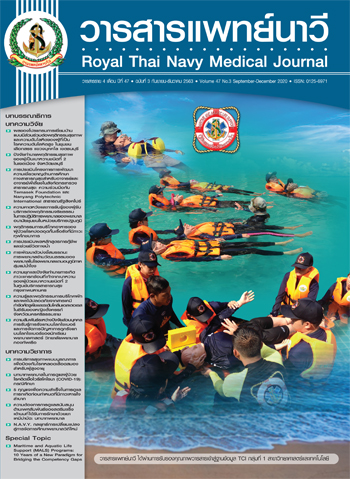Knowledge and Safe Consumption Behavior of Vegetables and Fruit from Pesticides and Serum Cholinesterase Levels in Pregnant Women, Nakhon Si Thammarat Province
Main Article Content
Abstract
The purpose of this cross-sectional descriptive research was to study the knowledge and safe consumption behavior of vegetables and fruit from pesticides and serum cholinesterase levels in pregnant women in Thasala district, Nakhon Si Thammarat province. The sample was 156 pregnant women. The data was collected during April – June 2019 by using the personal questionnaire, the knowledge of fruit and vegetable consumption questionnaire based on the content validity index (CVI) wich was 0.85 and the reliability index KR-20 was 0.98. The behavior of fruit and vegetable consumption questionnaire based on the content validity index (CVI) of 0.85, the Cronbach's alpha coefficient was 0.75, the cholinesterase reactive paper sensitivity was 77.04%, the specificity was 90.01% and the positive predicted value was 90.38%. Analysis of the personal data and behavior and the knowledge of fruit and vegetable consumption were done by percentage, average and standard deviation. The correlation was analyzed by using Chi-square test.
The research result showed that the averages of sample age were 28.48 years old (SD = 6.38), 64.10% graduated from secondary school. The averages of gestational age were 19.17 weeks (SD = 10.86). 40.38% were pregnant in the first trimester who had proper consumption quantity at 18.59% and 19.87% successively. Most of them were knowledgeable about the consumption of vegetables and fruit safely at 58.98%, followed by high level at 40.38%. The behavior of consumption of vegetables and fruits is safe at a high level of 87.73%. Knowledge correlated with safe vegetable and fruit consumption behavior (p < .01) but knowledge and behavior did not correlate with serum choline levels.
Article Details

This work is licensed under a Creative Commons Attribution-NonCommercial-NoDerivatives 4.0 International License.
References
Siriarunrat S, Tachasuksri T, Deoisres W. Prevalence and factors affected to excessive gestional weight among pregnancy women in the eastern part of Thailand. Journal of Public Health Nursing 2018;3(32):19-36. (in Thai).
Bolduc FV, Lau A, Rosenfelt CS, Langer S, Wang N, Smithson L, et al. Cognitive enhancement in infants associated with increased maternal fruit intake during pregnancy: results from a birth cohort study with validation in an animal model. EBioMedicine 2016;1(8):331-40.
María TM, Boris AL, Dana BB, Kyle S, Karen LP, Barry R, et al. Neurodevelopmental effects in children associated with exposure to organophosphate pesticides: a systematic review. Neurotoxicology 2013;1(39):158-68.
Bureau of Health Promotion, Department of Health, Ministry of Public Health. Mother and child health notebook. Bangkok: The War Veterans Organization Printing Mill; 2019.
Vatsala L, Prakash J, Prabhavathi SN. Food security and nutritional status of women selected from a rural area in South India. J Food Nutr Popul Health 2017;1(2:10):1-8.
Njage PM, Opiyo B, Wangoh J, Wambui J. Scale of production and implementation of food safety programs influence the performance of current food safety management systems: case of dairy processors. Food Contr 2018;1(85):85-97.
Evans RT, Wroe JM. Plasma cholinesterase changes during pregnancy: their interpretation as a cause of suxamethonium-induced apnea. Anaesthesia 1980;35(7):651-4.
Rauch SA, Braun JM, Barr DB, Calafat AM, Khoury J, Montesano MA, Yolton K, Lanphear BP. Associations of prenatal exposure to organophosphate pesticide metabolites with gestational age and birth weight. Environ Health Perspect 2012;120(7):1055-60.
Taylor M, Kelly M, Noël M, Brisdon S, Berkowitz J, Gustafson L, et al. Food safety knowledge and behavior among pregnant women. Nursing Journal 2018;2(45):112-23. (in Thai).
Barrett ES, Sathyanarayana S, Janssen S, Redmon JB, Nguyen RHN, Kobrosly R, et al. Environmental health attitudes and behaviors: findings from a large pregnancy cohort study. Eur J Obstet Gynecol Reprod Biol 2014;176:119-25.
Warwick D. The KAP survey: dictates of mission versus demands of science. London: Harvard Institute for International Development; 1983.
Jantasuwan R, Jaraeprapal U. Preventive behavior of chemical substances in fruits and vegetables into the body and blood levels of cholinesterase in the consumer who live in Khao Pra Bath sub-district, Nakhon Si Thammarat province. J DMS 2019;43(6):119-25. (in Thai).
Lumpo W, Sripichyakan K, Phianmongkhol Y. Food safety knowledge and behavior among pregnant women. Nursing Journal 2018;45(2):112-23. (in Thai).
Liaotrakoon W, Liaotrakoon V, Peanleangchep P, Duamkhanmanee R. Detection of organophosphate and carbamate pesticide residues in fresh vegetables in Phra Nakhon Si Ayutthaya province and effectiveness of washing methods on pesticide residues in Kale. King Mongkut’s Agr J 2020;38(1):131-8. (in Thai).
Hertz-Picciotto I, Sass JB, Engel S, Bennett DH, Bradman A, Eskenazi B, et al. Organophosphate exposures during pregnancy and child neurodevelopment: recommendations for essential policy reforms. PLoS Med 2018;15(10):e1002671.
Thamwiriyasati N, Malaiket W, Kanokleardwong K, Singsanan S. Serum cholinesterase level and its impact on health condition of fresh fruit and vegetable consumers. J Health Sci Res 2019;13(2):52-62. (in Thai).
Ministry of Public Health Health System Research Institute and the Office of Health Promotion Foundation (2014). [Internet]. [cited 2020 May 27]. Available from: http:// globocan.iarc.fr/Pages/fact_sheets_cancer.aspx?cancer=colorectal.


